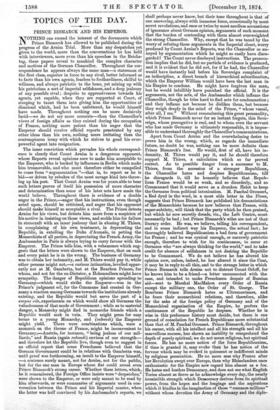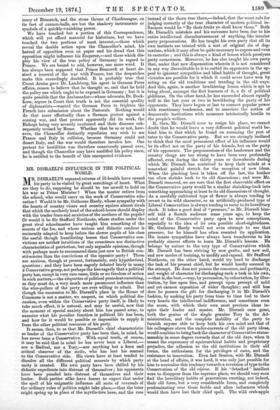TOPICS OF THE DAY.
PRINCE BISMARCK AND HIS EMPEROR.
NOTHING can exceed the interest of the documents which Prince Bismarck has allowed to be published during the progress of the Arnim Trial. More than any despatches yet given to the world, more than the conversations he has held with interviewers, more even than his speeches in the Reichs- tag, these papers reveal to mankind the complex character and motives of the German Chancellor. Throughout the cor- respondence he appears always the same man—a statesman of the first class, superior in force to any rival, better informed as to facts than his own agents, fearless to foolhardiness, skilful to wiliness, and always patriotic to the bone, yet mixing up with his patriotism a sort of imperial selfishness, and a deep jealousy of any possible rival ; despotic to oppressiveness towards his agents, yet capable, when they are supported at Court, of stooping to taunt them into giving him the opportunities of dismissal which, had he been unfettered, he would himself have made. Throughout nothing can be more decisively lucid—we do not say more accurate—than the Chancellor's views of foreign affairs as they existed during the occupation of France, nothing more patent than his anger that the Emperor should receive official reports penetrated by any other ideas than his own, nothing more irritating than the contemptuous irony with which he strives to goad his over- powerful agent into resignation.
The inner conviction which pervades his whole correspond- ence is clearly that Count Arnim is a dangerous opponent, whose Reports reveal opinions sure to make him acceptable to the Emperor, who is backed by influences in Berlin which make him irremovable, and who must therefore either be compelled to cease from " argumentation "—that is, to report as he is bid—or driven by rebukes of, the most savage kind into throw- ing up his post. That Count Arnim was for yearaable to bear such letters proves of itself his possession of more character and determination than some of his later acts have made the world believe. Throughout there is evidence of a double anger in the Prince,—anger that his instructions, even though acted upon, should be criticised, and anger that his opponent should make himself so acceptable a rival. The Prince detests Arnim for his views, but detests him more from a suspicion of his motive in insisting on those views, and scolds him for failure in statecraft with an inner jealousy that in abusing M. Thiers, in complaining of his own treatment, in deprecating the Republic, in extolling the Duke d'Aumale, in petting the Monarchists of all parties, in depreciating the French Army, the Ambassador in Paris is always trying to curry favour with the Emperor. The Prince tells him, with a vehemence which sug- gests that the letters were shown to the Emperor, that on each and every point he is in the wrong. The business of Germany was to obtain her indemnity, and M. Thiers would pay it, while other persons might not,—a curious intimation, levelled appar- ently not at M. Gambetta, but at the Bourbon Princes, for whom, and not for the ex-Dictator, a Hohenzollern might have sympathy. The danger of Republican opinions spreading to Germany—which would strike the Emperor—was in the Prince's judgment nil, for the Commune had created in Ger- many a reaction among Germans towards the institutions already existing, and the Republic would but serve the part of a corpus vile, experiments on which would show all Germans the valuelessness of that mode of Government ; while as to material danger, a Monarchy might find in monarchs friends which a Republic would seek in vain. They might press for easy terms to a young Monarchy, and (subaudi) the Emperor might yield. There were combinations which, were a monarch on the throne of France, might be inconvenient to Germany,—Austria, for instance, "being jealous of our mil- liards," and Russia (again subaudi) envious of our strength— and therefore let the Republic live, though even to suggest in an official report that some Frenchmen believed that the German Government could be in relations with Gambetta was, until proof was forthcoming, an insult to the Emperor himself, —a sentence surely meant, not for Arnim, not for the public, but for the one man in Europe whose fiat could arrest even Prince Bismarck's strong career. Whether these letters, which, be it remembered, the Foreign Office insists were "despatches," were shown to the Emperor, or were only meant to be read by him afterwards, or were summaries of arguments used in con- versation between the Prince and his Imperial master, when the latter was half convinced by his Ambassador's reports, we shall perhaps never know, but their tone throughout is that of one answering, always with immense force, occasionally by most secret revelations, and once or twice by most needless accusations: of ignorance about German opinion, arguments of such moment that the burden of contending with them almost overweighted the strong Chancellor. Why, except that he was taxed by the worry of refuting these arguments in the Imperial closet, worry produced by Count Arnim's Reports, was the Chancellor so an- noyed by argumentation which he might so easily have disre- garded? The Count never disobeyed instructions. The prosecu- tion implies that he did, but no particle of evidence is produced, and it is evident that he did not, for if he had, the Chancellor would have instantly laid before his Sovereign complaint of an indiscipline, a direct breach of hierarchical subordination, which the Emperor William would have been the last man in. his Empire to condone. He might have forgiven the man, but he would infallibly have punished the official. It is the arguments, not the acts, of the Ambassador which inflame the Chancellor, though he tries hard to find acts for condemnation; and they inflame not because he dislikes them, but because they weigh deeply in the mind of the Prince, " whose vassal, after all, I am." Without remembering this great personality, which Prince Bismarck never for an instant forgets, this Sove- reign, whose prerogative is real, and to whom even the servant who has made Germany is ultimately responsible, it is impos- sible to understand thoroughly the Chancellor's communications..
Apart from Count Arnim and the overwhelming desire to prove him in the wrong, which, as regards the immediate- future, no doubt he was, nothing can be more definite than. Prince Bismarck's line. He would, first of all, have his in- demnity, M. Thiers would pay it, and he should therefore support M. Thiers, a calculation which so far proved correct. As to possible danger from a successor to M.. Thiers, from the accession of a stronger Republican,. the Chancellor hates and despises Republicanism, till he disregards it, till he honestly believes that Repub- lican France would be so weak, and so disorderly, and so. Communard that it would serve as a drunken Helot to keep the Germans from political intoxication. M. Paschal Grousset, a Red dyed in the wool, in a most able letter in the Times, suggests that Prince Bismarck has published his denunciations of the Monarchists because he now believes that France, with super-subtlety, will think that the party which he then praised, but which he now secretly dreads, viz., the Left Centre, must. necessarily be bad ; but Prince Bismarck's wiles are not of that literary order. He was, we believe, telling his correspondent, and in some indirect way his Emperor, the actual fact ; he. thoroughly believed Republicanism a bad form of government for France ; and he was cynical enough, or narrowly patriotic enough, therefore to wish for its continuance, to sneer at Germans who "are always thinking for the world," and to take credit for absence of selfishness in not desiring the Republic to be Communard. We do not believe he has altered his opinion now, unless, indeed, he has altered it since the Czar,. it may be in reply to all this, and to the strange letter in which Prince Bismarck tells Arnim not to distrust Count Orloff, for- he knows him to be a friend—a letter unconnected with the case, and intended to make Frenchmen despair of Russian: aid—sent to Marshal MacMahon every Order of Russia except the military one, the Order of St. George. The Bourbons Prince Bismarck hates as Ultramontanes, and he fears their monarchical relations, and therefore, alike for the sake of the foreign policy of Germany and of the Monarchical organisation of the Empire, he prefers the continuance of the Republic he despises. Whether he is wise in this preference history must decide, but there is one ground of consolation for French Republicans more substantial than that of M. Paschal Grousset. Prince Bismarck, throughout his career, with all his intellect and all his strength and all his marvellous success, has shown an inability to comprehend the depth of purely spiritual, we do not mean religious, but spiritual forces. He has no more notion of the force Republicanism, if time is granted it, may evoke than he has notion of the fervour which may be evoked in quiescent or indifferent minds by religious persecution. He no more sees why France after her Revolution swept over Europe, than why Rhinelanders once enthusiastic for the Empire now regard him almost as a foe. He hates and loathes Democracy, and does not see what English Tories almost as fierce as he acknowledge every day, the nearly irresistible strength which Democracy derives from its spiritual power, from the hopes and the longings and the aspirations which it kindles in the imagination of those "common millions" without whose devotion the Army of Germany and the diplo-
macy of Bismarck, and the stone throne of Charlemagne, on its feet of cannon-balls, are but the shadowy instruments or symbols of a quickly-vanishing power. We have touched but a portion of this Correspondence, which will yet afford material for historians, but we have touched the two portions of most interest,—those which reveal the double action upon the Chancellor's mind, his hatred of opposition even on paper and his dread that this opposition might influence his Emperor,—and those which dis- play his view of the true policy of Germany in regard to France. We are bound to add, however, one more word. It has always been supposed that Prince Bismarck at heart de- sired a renewal of the war with France, but the despatches make this exceedingly doubtful. It is probably true that Count Arnim gave Dr. Landsberg, his agent in German Press affairs, reason to believe that he thought so, and that he held - the policy one which ought to be exposed in Germany ; but it is quite possible that the Ambassador—whose advocate, Dr. Dock- horn, argues in Court that truth is not the essential quality of diplomatists—wanted the German Press to frighten the French into submission about the Pastorals. Nothing would do that more effectually than a German protest against a coming war, and that protest apparently did its work, the Bishops being very severely cautioned and their dioceses sub- sequently revised by Rome. Whether that be so or not, how- ever, the Chancellor distinctly repudiates any wish to see France and Italy in collision, because Germany could not desert Italy, and the war would therefore involve her. One pretext for hostilities was therefore consciously passed over, and though the Chancellor may have modified his policy since, he is entitled to the benefit of this unexpected evidence.







































 Previous page
Previous page